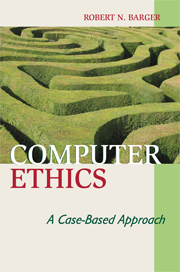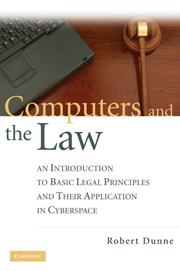Computer Ethics
Teaches students how to solve ethical dilemmas in the field of computing, taking a philosophical, rather than a legal, approach to the topic. It first examines the principles of Idealism, Realism, Pragmatism, Existentialism, and Philosophical Analysis, explaining how each of them might be adopted as a basis for solving computing dilemmas. The book then presents a worksheet of key questions to be used in solving dilemmas. Twenty-nine cases, drawn from the real-life experiences of computer professionals, are included in the book as a means to let students experiment with solving ethical dilemmas and identify the philosophical underpinnings of the solutions.
- Explains the steps of the ethical decision making process in handy worksheet form
- Appendix with suggested topics for presentations, discussion, and papers
- End of chapter summaries and questions foster better understanding of the material
Reviews & endorsements
'The book is a work of merit. I think it would be an excellent choice for a course in computer ethics, privacy or security.' Computing Reviews
'The book is a work of merit. I think it would be an excellent choice for a course in computer ethics, privacy or security.' James Van Speybroeck, St Ambrose University
Product details
September 2008Hardback
9780521882514
264 pages
229 × 152 × 16 mm
0.52kg
11 b/w illus.
Available
Table of Contents
- 1. Introduction
- 2. The computer as a humanizing agent
- 3. Philosophic belief systems
- 4. A philosophic inventory
- 5. The possibility of a unified ethical theory
- 6. The ethical decision making process
- 7. Psychology and computer ethics
- 8. The computing field as a profession
- 9. Computer-related codes of ethics
- 10. Computer ethics and international development
- 11. Robotics and ethics
- 12. Theft and piracy concerns
- 13. Cases concerning theft and piracy
- 14. Privacy concerns
- 15. Cases concerning privacy
- 16. Power concerns
- 17. Cases concerning power
- 18. A miscellaneous collection of cases
- 19. Parasitic computing case
- Appendix. Topics for presentations, discussions, and papers.






